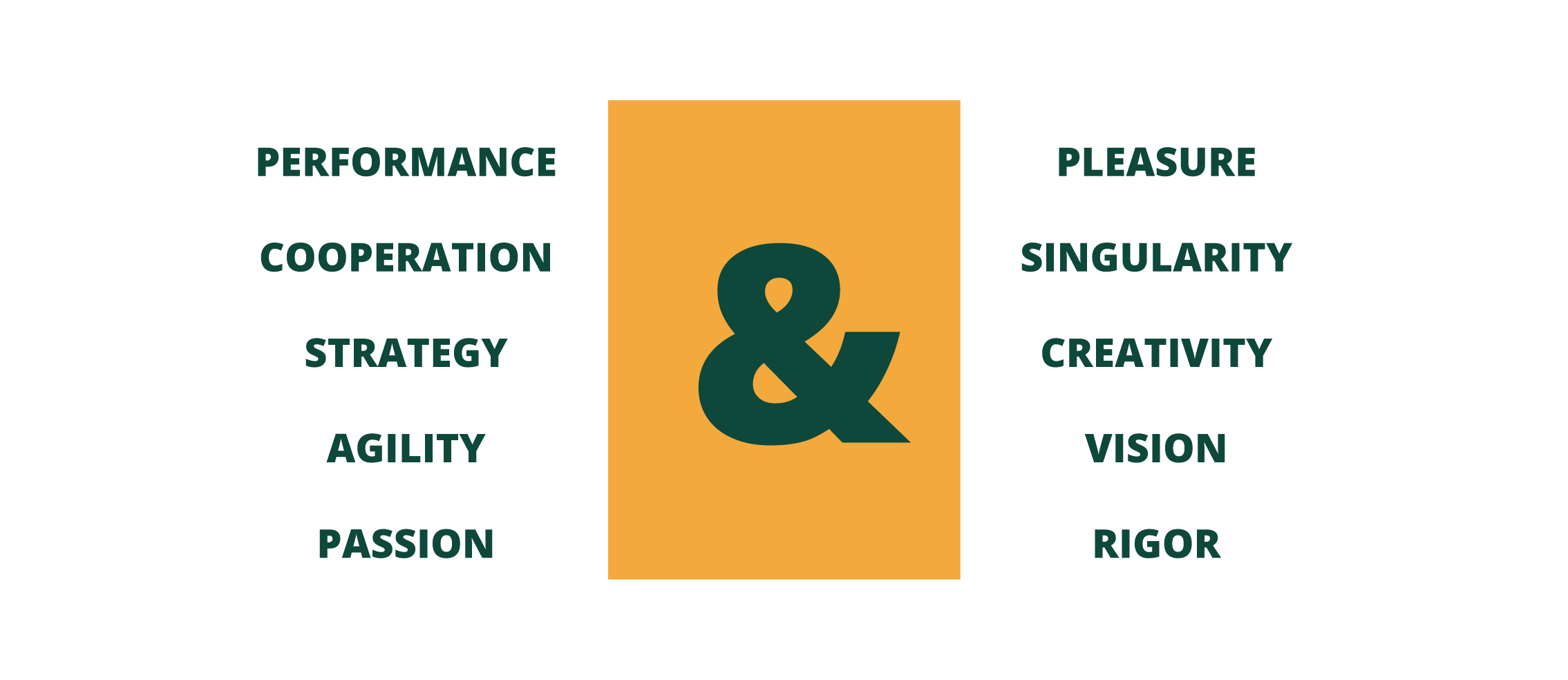
Ever more rapid developments are shaking up our environment,
question our ways of doing and working, and require companies to know how to evolve and transform themselves ever more quickly.
It is by preserving and respecting employees and customers,
by helping teams to develop and give the best of themselves, by linking meaning to actions and actions to meaning, that companies succeed in these transformations.
To meet the challenges of transformation,
individuals and teams need to take pleasure in what they do to regenerate their vitality.

Our founding belief :
the culture of AND
Our culture and education have formatted us to see the world in a binary way.
We often see things in terms of opposites: black or white, full or empty, good or bad, right or wrong. Similarly, the company is often described as a territory in which a multiplicity of opposing stakes oppose each other and between which a choice must be made: the individual or the collective, the directive or the supportive, the long term or the short term, the financial or the human, the control or the trust, the customer or the shareholder, the performance or the pleasure, etc. This systematic opposition leads to thinking of choices, at best as preferences: "this rather than that", at worst as exclusions: "this against that". We believe that in an increasingly complex world, combining, adding, allowing, is more effective than excluding, prohibiting, dividing. We call this third way, which consists of reconciling rather than opposing, the culture of AND.
Our formula behind the ecology
of performance
Strategy
& Objectives
& Pleasure
& resilience
- Clarifying the strategies and objectives.
- Giving meaning to strategic and operational, collective and individual issues and knowing how to communicate them.
- Finding concrete and visible indicators to observe the effectiveness of the actions implemented and be able to adjust them.
- Building on the strengths of the organisation and the skills of its employees to achieve excellence.
- Developing relational intelligence as a vector of cooperation and pleasure.
- Paying as much attention to employees as to customers.
- Considering confrontation a positive force for building healthy team dynamics and new organisational modes.
- Taking into account the cognitive, emotional and relational dimensions of the person.
- Generating a different kind of efficiency and profitability by reducing the complexity of organisations, simplifying processes and decision-making channels.
- Flattening hierarchy levels to increase speed and efficiency.
- Optimising decision making and actions implementation.
- Reducing meeting times.
- Asking all relevant questions... and impertinent ones.
- Confronting with benevolence to challenge beliefs and preconceived ideas.
- Thinking about performance in a reasoned and humane way.
- Helping teams to build relationships that foster collaboration, trust and enjoyment of working together.
- Helping everyone develop the quality of presence to themselves and to others.
- Strengthening the feedback culture.
- Strengthening the spirit of partnership, transparency and co-construction.
- Helping everyone to evolve in their role, to grow in order to maximise their talents.
- Helping teams build genuine interactions and transversality that generates creativity and innovation.
- Helping each individual and each team to allow themselves - even force themselves, to take a step back to be in action vs. in reaction.
- Realising that a close-knit group working in dialogue and cooperation limits the effects of pressure.
- Defining the framework, mission, objectives and resources as well as the company's ability to reassert and/or challenge them.
- Implementing healthy relationship guidelines; being able to speak up and communicate in a way that respects the other person, listening to their expectations and needs, not communicating or adding stress.
- Encouraging individuals and teams to celebrate their small and big wins to fuel a positive spirit and the desire to take the next step.
Strategy
& Objectives
- Clarifying the strategies and objectives.
- Giving meaning to strategic and operational, collective and individual issues and knowing how to communicate them.
- Finding concrete and visible indicators to observe the effectiveness of the actions implemented and be able to adjust them.
- Asking all relevant questions... and impertinent ones.
- Confronting with benevolence to challenge beliefs and preconceived ideas.
- Thinking about performance in a reasoned and humane way.
& Pleasure
- Building on the strengths of the organisation and the skills of its employees to achieve excellence.
- Developing relational intelligence as a vector of cooperation and pleasure.
- Paying as much attention to employees as to customers.
- Considering confrontation a positive force for building healthy team dynamics and new organisational modes.
- Taking into account the cognitive, emotional and relational dimensions of the person.
- Helping teams to build relationships that foster collaboration, trust and enjoyment of working together.
- Helping everyone develop the quality of presence to themselves and to others.
- Strengthening the feedback culture.
- Strengthening the spirit of partnership, transparency and co-construction.
- Helping everyone to evolve in their role, to grow in order to maximise their talents.
- Helping teams build genuine interactions and transversality that generates creativity and innovation.
& resilience
- Generating a different kind of efficiency and profitability by reducing the complexity of organisations, simplifying processes and decision-making channels.
- Flattening hierarchy levels to increase speed and efficiency.
- Optimising decision making and actions implementation.
- Reducing meeting times.
- Helping each individual and each team to allow themselves - even force themselves, to take a step back to be in action vs. in reaction.
- Realising that a close-knit group working in dialogue and cooperation limits the effects of pressure.
- Defining the framework, mission, objectives and resources as well as the company's ability to reassert and/or challenge them.
- Implementing healthy relationship guidelines; being able to speak up and communicate in a way that respects the other person, listening to their expectations and needs, not communicating or adding stress.
- Encouraging individuals and teams to celebrate their small and big wins to fuel a positive spirit and the desire to take the next step.
